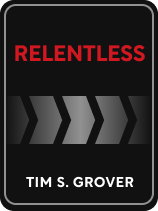

This article is an excerpt from the Shortform book guide to "Relentless" by Tim Grover. Shortform has the world's best summaries and analyses of books you should be reading.
Like this article? Sign up for a free trial here .
Do you want to know how to control your emotions and feelings? Did you also know you can also intimidate your competition by doing this as well?
If strong enough, emotions and feelings can negatively impact your self-esteem and motivation. However, if you use your emotions for good, you can hype yourself up while taking out the competition.
Here’s Tim Grover’s advice on how to control your emotions and feelings, along with your competition’s, from his book Relentless.
Controlling Emotions and Feelings
Grover explains that you can direct your instincts to help control emotions. Directing your instincts to control emotion is crucial for consistent relentlessness because as we’ve discussed, strong emotions like fear and uncertainty can cause you to freeze up or doubt yourself—preventing you from acting relentlessly.
(Shortform note: While Grover argues that blocking out emotions will help you act decisively and confidently, psychological research contrasts with this idea. In Descartes’ Error, Antonio Damasio explores the role of emotions and feelings in decision-making. He researched people unable to experience emotion due to brain damage and found that they have trouble making simple decisions, often taking hours to do so. This contrasts with Grover’s argument that fewer emotions will make you more decisive. However, one could view Grover’s argument as a recommendation to avoid emotions that prevent decisiveness (such as fear) rather than to block out emotion altogether.)
Below, we’ll explain Grover’s guidelines for how to control emotions and feelings.
Use Intense Focus
Grover explains that acting instinctively helps you control your emotions because it activates intense focus, a state of mind where you block out all emotions except for focused, determined anger. Acting instinctively helps you activate intense focus because you won’t have time to think and distract yourself. Intense focus only allows anger through—Grover argues that anger motivates you to overcome obstacles and succeed, so it helps you instead of getting in your way.
(Shortform note: Grover suggests that acting on instinct will help you avoid strong emotions, but many psychologists provide a contrasting view. Research around panic suggests that it comes from a “fight or flight” response—our natural, instinctual response to potential danger. In other words, instinct can create strong fearful emotions if you’re not able to direct it into intense focus.)
Grover says that activating intense focus involves a different method for each individual, but tends to involve one of these three: getting angry, staying calm, or staying positive. We’ll now explore how these three can help activate intense focus.
Method #1: Get Angry
Grover explains that you can activate intense focus by finding a challenge that stirs up anger in you and forces you to focus intently on beating it.
For example, Grover mentions that he would often insult unstoppable people he worked with or bring up their insecurities. This would challenge them to prove him wrong—a challenge they would meet by activating intense focus.
| Using Anger to Overcome: The 2,500 Year Debate Grover’s claim that you can channel anger towards productive action touches on a long-running philosophical and psychological debate on the subject. Philosophers from ancient Rome’s Seneca (On Anger) to modern day Martha Nussbaum (Anger and Forgiveness) argue against the use of anger, claiming that it’s a destructive and selfish desire that will get in the way of any productive action. On the other hand, works ranging from Aristotle’s Rhetoric to bell hooks’ killing rage argue that anger allows you to recognize obstacles and inspires you to overcome them. Psychological research also suggests that anger plays an essential role in motivating you to survive and overcome adverse situations. By indicating that you can use anger to activate intense focus, Grover seems to align himself with the latter group. |
Method #2: Stay Calm
To help yourself focus intensely, Grover recommends you work to stay calm instead of getting excited or hyped up. By staying calm, you can more easily control your emotions to focus intensely. Grover recommends you stay calm by keeping consistent routines and avoiding new people or situations if you know you’ll need to focus intensely. This way you don’t have to deal with anything unexpected that might make you emotional.
For example: If it’s the night before a big presentation, stick to your normal nighttime routine instead of trying anything new or being around different people. This way, you won’t have to deal with any extra emotion or pressure from new situations.
(Shortform note: Chip and Dan Heath (The Power of Moments) further expand on Grover’s argument that routines are important for staying calm and acting instinctively. They explain that routines help you stay calm because they prepare automatic responses to high-pressure situations. These prepared responses mean that when you experience tense moments (like a big presentation), you’ll act out your response on autopilot. This way, you won’t have to plan while in a tense moment, something that often leads to panic and uncertainty.)
Method #3: Stay Positive
While not thinking is the goal of intense focus, if it’s not possible in a given moment then Grover recommends instead focusing on positive thoughts like happy and relaxing memories. These allow you to stay calm and prevent emotions like fear from holding you back.
(Shortform note: Grover’s recommendations in this section might confuse you, since feeling happy or calm conflicts with being angry. To clarify, Grover claims that each person has their own way to activate intense focus, not that everyone should use all three methods.)
Control Emotions and Feelings to Intimidate Others
You can also control the emotions and feelings of your competition by intimidating others with the decisiveness that comes from mastery and directed instincts. Your mastery will intimidate competitors because it allows you to adapt and deal with whatever they do. Additionally, the instant and decisive nature of your instinctive action will intimidate competitors by forcing them to deal with situations they didn’t expect. This intimidation will instill fears and self-doubts in your competition that will prevent them from acting relentlessly.
(Shortform note: Not every discipline would benefit from the kind of intimidation Grover recommends—many disciplines are more collaborative than they are competitive. For example, child care and teaching benefit extensively from collaboration in most cases, while competition only helps in specific circumstances. So, while it may benefit you to direct your emotions to intimidate in a competitive setting, you may want to direct your emotions to inspire or encourage in a collaborative setting.)

———End of Preview———
Like what you just read? Read the rest of the world's best book summary and analysis of Tim Grover's "Relentless" at Shortform .
Here's what you'll find in our full Relentless summary :
- The qualities you’ll need to become the best in your field
- Why sacrifices and discomfort are necessary for growth
- Why you should practice indulging in your primal self






